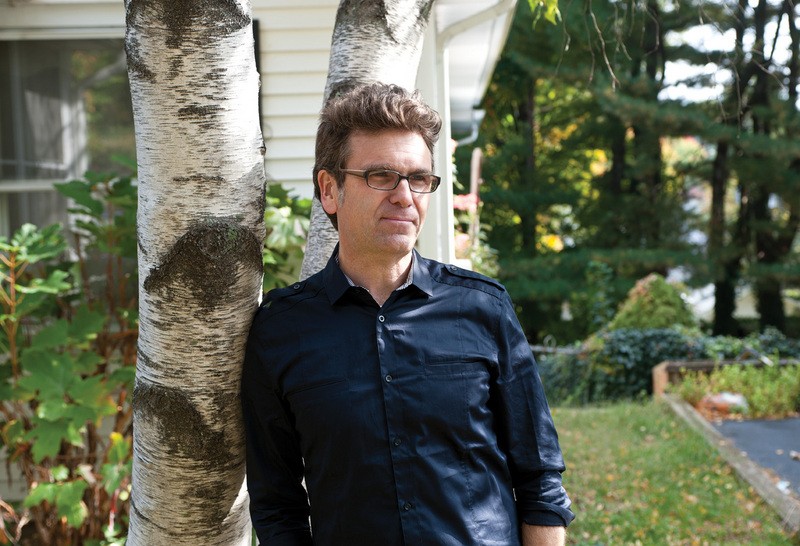There’s a high body count in David Means’s fiction. The Nyack resident’s fourth story collection, The Spot (Faber & Faber, 2010), includes haunting descriptions of deaths by crucifixion, stabbing, strangulation, drowning, gunfire, and spontaneous human combustion. True, there are stories in which no one dies—“Reading Chekhov” is a delicate tale of a waning affair; “A River in Egypt” portrays a desperate father and son in a hospital testing room; “The Knocking” is a comically stylized take on the noisy neighbor from hell—but the book has a magisterial bleakness, leavened by prose of surpassing beauty.
In the title story, a man tells the underage girl he’s pimping, “That little pucker on the surface out there is where the Cleveland water supply is drawn in, right there, and if you were to dump enough poison on that spot, you’d kill the entire city in one sweep.”
The image recalls a story in Means’ 2004 collection, The Secret Goldfish, in which another small-time thug watches water sluice over the lip of a fish hatchery tank. “He liked how the glossy top, coated with algae and pollen dust, moved at a leisurely pace until it got to that little razor-blade spot where it roared over the edge. That spot. That’s where he lived all the time.”
It’s an apt metaphor for Means’s work. Like his northern-midwestern compatriots Joel and Ethan Coen, he’s a technical virtuoso who can jump-cut from harrowing cruelty to an image so gorgeous it makes you gasp. His humor is often pitch-black, as when a teenage hooker in “The Spot” strangles a john with his bolo, then tries on the denture that pops from his mouth, intoning, “What’s up, Doc?” The story ends on a note of compassion, as water released from a whirlpool flows “into the relative calm of the river as it headed toward the merciful breadth of Lake Ontario.”
Means published his first collection, A Quick Kiss of Redemption, in 1993, but Assorted Fire Events put him on the map in 2000, beating out Philip Roth for the Los Angeles Book Prize and garnering a National Book Critics Circle nomination. He has been teaching at Vassar College since 2001, and is reading tonight at the Campus Bookstore. He sits outside Babycakes Café on a sunny fall day, discussing his craft between bites of a BLT.
Dressed in a dark blue shirt and jeans, Means has the kind of rumpled handsomeness that inspires undergraduate crushes. His manner is friendly, but far from relaxed; he rarely gives in-person interviews. Though he clearly enjoys talking about writing and literature, questions about his own life make him physically uncomfortable. He twists in his seat, eyes darting behind dark-framed glasses as he gauges exactly how much he wants to reveal.
Means grew up in Kalamazoo, Michigan (“Glenn Miller!” he says with ironic glee), and majored in English at the College of Wooster, Ohio. Though he moved to New York in his twenties, receiving an MFA in poetry from Columbia, and has lived with his family in Nyack for nearly two decades, his Michigan roots have a powerful hold on his psyche. “I don’t think you can take the Midwest out,” he says with a grimace, describing himself as “an ex-pat” and “a recovering ex-midwesterner.”
An eclectic reader, Means also cites photographers Steven Shore and W. Eugene Smith as inspirations, along with a lot of musicians. The album cover of Springsteen’s Nebraska is framed above his desk. “I’ve loved Springsteen and Dylan my whole life,” he declares. “I come from a working-class town, near a paper mill. We thought Springsteen was ours.”
Means compares assembling a story collection to “putting together an old-fashioned record album: slow song, fast song. I think there’s a resonance. The story you just read is still in your mind when you’re reading the next.” He writes stories one at a time, frequently setting them down for long stretches before going back to revise, which he likens to “interrogating the draft, putting it under a very bright light.” He often holds back finished stories that don’t seem to fit a specific collection.
Means is among an elite group of authors who specialize in short fiction—Alice Munro, Raymond Carver, Grace Paley—and he’s often asked why; the Paris Review once published a Q&A titled “Why David Means Is Not a Novelist.” Still, there’s a long hesitation before he responds. “I could easily say, ‘I always read short stories,’ which I did. But I think it’s more a matter of what tool I could find that I could work with to do what I wanted to do,” he says. “Just by virtue of being the length they are, whether they want to or not, stories remind us of our own mortality, of the fleetingness of things.”












